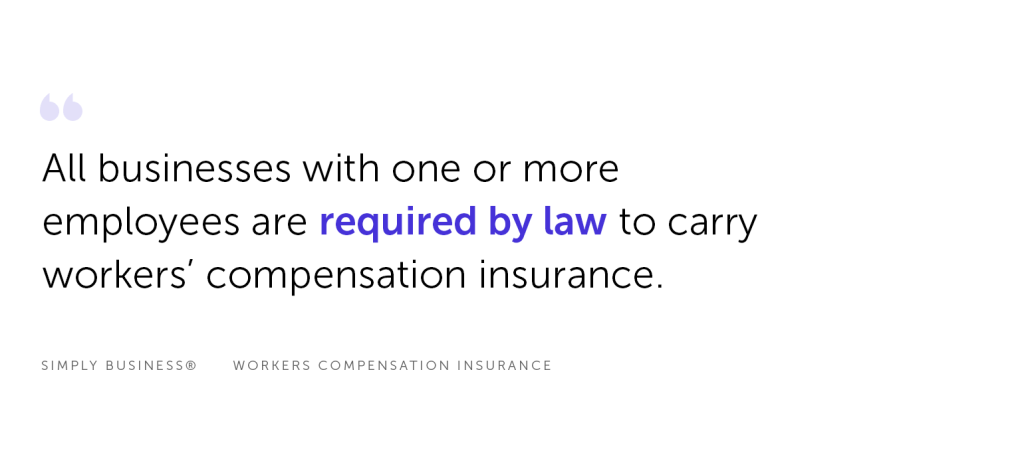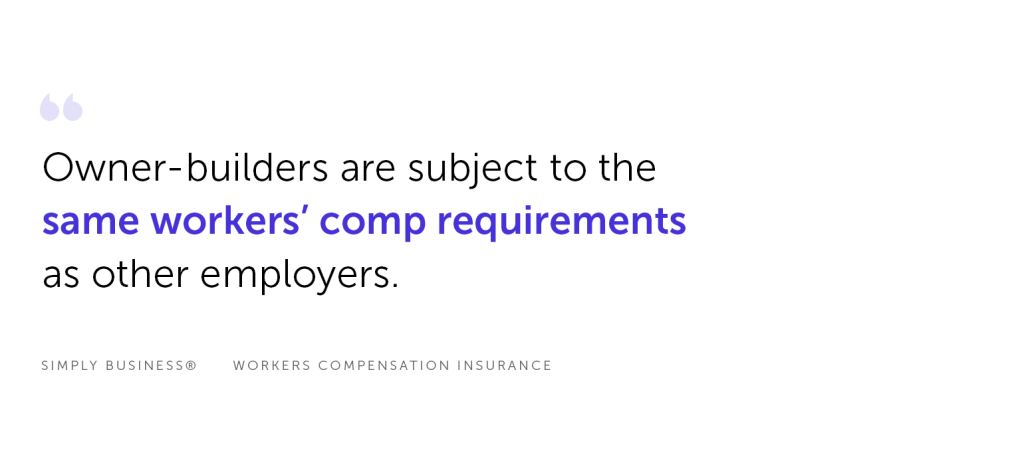California Workers’ Compensation Insurance
A guide to workers’ compensation insurance for small business owners in the Golden state.
Simply Business is pleased to provide tailored insurance options from:
Any sensible employer knows that running a business comes with a variety of challenges. Every day, business owners are faced with unpredictable obstacles, any of which could cause problems for the business or its employees. While it’s crucial to put a structure in place to maintain a safe work environment, it’s impossible to fully safeguard against the unexpected.
Workers’ compensation is one way an employer can help protect their business against what life throws at it. Workers’ compensation insurance provides financial benefits and reimbursement to employees who become injured or ill as a result of workplace conditions.
Common workers’ comp claims include:
- Concussions from impact to the head.
- Broken bones and fractures, often due to improper use of heavy machinery.
- Workplace burns from steam, fire from furnaces, or different heat sources in restaurant work.
- Strains, commonly caused by repetitive manual labor.
Every state has different requirements for workers’ comp coverage. If you’re a business owner in California — or are thinking of becoming one — it’s crucial that you’re covered, according to the state’s guidelines. Read on to learn more about workers’ comp requirements in California and how to find coverage.

State of California Workers’ Compensation Requirements
One of the first orders of business for employers in the Golden State is to research local commercial insurance requirements.
So what are California’s workers’ comp insurance requirements? Let’s dive in.
Does California require workers’ compensation insurance?
The short answer is yes.
Fortunately, California workers compensation requirements are fairly straightforward. In the state of California, all businesses with one or more employees are required by law to carry workers’ compensation insurance. This requirement is dictated by California Labor Code Section 3700.
If an employer does not want to obtain a policy through an insurance carrier, they may elect to self-insure, but only if they meet the criteria. In order to self-insure in California, an employer must submit an application to the Office of Self-Insurance Plans and subsequently obtain its approval. Application requirements include:
- Proof of three calendar years in business.
- Three years of financial statements. These must be certified and independently audited.
- Three years with an acceptable credit rating.
Essentially, an employer must prove they have a financial status that’s healthy enough to cover claims, should they arise. Prior to approval, the employer’s proposed benefit delivery system must be deemed suitable by the state. In addition to state approval, an employer must have a net worth of at least $5 million, and a net income of at least $500,000 per year.
Who is required to have workers’ compensation insurance in California?
While all employers with one or more workers are required to carry workers’ comp insurance in California, there are some additional specifics to keep in mind.
All California state-run employers are required to provide workers’ compensation benefits. State employees receive these benefits through the State Compensation Insurance Fund. They act as the insurance agent and carrier.
What are the benefits of having workers’ compensation insurance in California?
If you fit the above criteria, you are required to carry workers’ compensation insurance or be accepted into the California self-insurance program. Here are some of the ways workers’ comp benefits small business owners and their employees:
- It can protect your business’s finances if a claim is filed. Without coverage, the cost of a claim could be devastating for your business, and even force you to close.
- It may cover legal fees if the claim results in a lawsuit.
- It could build trust with your employees. Workers feel safer, knowing that their employer has them covered if the unthinkable were to happen.
Do sole proprietors need workers’ comp insurance in California?
Business owners who are sole proprietors and do not have employees are not required to have workers’ compensation insurance in California. However, they can carry a policy if they choose. If a sole proprietor has one or more employees, then they must still carry workers’ compensation insurance in the State of California.
Penalty for not having workers’ compensation insurance in California
According to California Labor Code Section 3700, employers who meet the criteria for workers’ comp requirements and who fail to obtain coverage could face a stiff penalty.
In California, not carrying required coverage is considered a criminal offense. It could result in a $10,000 fine or more, or even jail time for up to a year. The state also issues penalties up to $100,000 for uninsured employers.
Additionally, should an employee get injured or sick as a result of workplace conditions, the uninsured employer will be responsible for paying all the related bills and could be subject to a civil claim from the injured employee if the employer is illegally uninsured.
Failure to pay workers’ compensation benefits could result in having to work with the Uninsured Employers’ Benefit Trust Fund. This fund will pay out benefits to employees with work-related injuries or illnesses. The fund will then seek reimbursement from the uninsured employer, and could lead to a lien against the employer’s property.
If the state labor commissioner finds an employer operating without the necessary workers’ comp coverage, they will issue a stop order, forcing the employer to cease use of employee labor until coverage is secured. The greater of the following two penalties may apply:
- The employer must pay twice the amount they would have paid for their workers’ comp premium during the gap in coverage. OR;
- The employer must pay $1,500 per employee on the payroll during the gap in coverage.
Who is exempt from workers’ compensation insurance in California?
There are very few exceptions to California’s workers’ compensation insurance requirements. In order to seek exemption, you must both:
- Submit an affidavit to the State proving you do not employ any workers who qualify under California Labor Code 3700;
- Not hold a C-39 Roofing certification.
However, certain business owners may be required by their licensing board to carry workers’ compensation in all cases. It’s best to check with the applicable licensing board to understand what your requirements are.
Do Independent Contractors Need Workers’ Comp Insurance in California?
Requirements can get tricky when it comes to independent contractors. Generally, an independent contractor works for an employer but is not considered an employee. Consequently, an employer’s workers’ compensation coverage would not extend to the independent contractor.
However, things can get complicated when classifying contractors and employees. Signed into law in 2019, AB 5 is a bill that sets a new standard when classifying employees and independent contractors. It states that in order to be classified as a worker, an employer must use the “ABC test.”
According to the State of California Department of Industrial Relations, the test’s criteria will presume a worker is an employee — and not an independent contractor — unless the worker meets all three of the following requirements:
- The worker must be free from the control of the employer with regard to work performance.
- The work done by the worker is outside the employer’s usual course of business.
- The worker works within a different established trade or business to the hiring party.
If those criteria are not met, the worker is typically considered an employee and entitled to workers’ compensation benefits through the employer.

Household Worker Workers’ Compensation Insurance in California
Workers’ compensation insurance requirements for household workers varies by state. For employers of household workers in California, they have to provide workers’ compensation when:
Work is performed inside of the house (e.g. a nanny) for 20 hours or more per week; or
Work is performed outside of the house (e.g. a gardener) for 10 hours or more per week
Also, in order for a household worker to obtain workers’ compensation benefits, the domestic workers must meet at least one of the following criteria within 90 days of an injury:
The employee has been employed for 52 or more hours.
The employee has earned $100 or more.
Coverage for domestic employees is generally obtained as part of a homeowner’s insurance policy but also can be obtained through the State Fund.
Owner-Builder Workers’ Compensation Insurance in California
The California Contractors State Licensing Board definition of an owner-builder is a person who owns the property where work is being performed and acts as their own general contractor for the work. The work site must be their primary residence for at least 12 months by the time work has been completed.
In California, owner-builders are subject to the same workers’ comp requirements as other employers. They must provide workers’ compensation coverage if they have one or more employees.

Short-Term Disability vs. Workers’ Comp Insurance in California
Knowing the difference between workers’ compensation insurance and short-term disability can be tricky. While workers’ compensation provides benefits to employees injured as the result of their work, short-term disability is coverage for employees with medical issues that are not work-related.
Another form of wage replacement benefits is Paid Family Leave, which can be used in order to care for family-related work leave, such as caring for an ailing family member or going on maternity leave. Both Disability Insurance and Paid Family Leave are provided by the California State Disability Insurance program.
Pay As You Go Workers’ Comp Insurance in California
One option for employers to consider when seeking quotes is a pay as you go workers’ comp plan. While many traditional workers’ compensation insurance policies require employers to pay upfront sums for coverage, a pay as you go plan allows them to make premium payments each time they process payroll.
Besides helping employers avoid making large cash payments, pay as you go offers another advantage. Each premium payment is based on the employer’s actual headcount at each payroll period. If you add or lose employees, your premium liability will change.

Workers’ Comp is Complicated — We Can Help
While owning and operating a business can be fulfilling and gratifying, it also comes with responsibilities. Your business is more than just a job — it’s your livelihood. Protecting it is a top priority. Carrying workers’ comp insurance could save you from footing a hefty bill, should an employee sustain an injury.
Simply Business can get you started. We partner with small business owners to help find insurance coverage that not only meets requirements, but also can help meet their businesses’ unique needs. Our online workers comp quote tool will help learn more about your business and needs, and will have a quote ready for you in just minutes.
Because protecting your business is our business.
How Much is California Workers’ Compensation Insurance?
As with most types of insurance, your workers’ compensation premium will be decided based on a number of factors. This could include your business’ industry, its claims history, and its total payroll. Read on to learn more about California’s workers’ compensation rating system.
California workers’ compensation insurance rates
According to the Workers’ Compensation Insurance Rating Bureau of California, the main determining factor for your workers’ comp premium is your business’s industry classification. Classifications have been formed by grouping together industries with similar levels of workplace risk. The classification a business falls under will help determine their insurance premium, based on that risk level.
According to 2021 data from the USDA, California was ranked the top agricultural-producing state in the country. The same year, dairy topped the list as the state’s most valued agricultural commodity. It’s a huge industry that involves a large workforce, many performing labor-intensive tasks. Based on common risk factors on dairy farms — such as risks associated with operating machinery — the industry’s workers’ comp insurance rating was $6.94 as of September 2022. This rate is applied per every $100 of the business’s total payroll.
Simply Business offers workers’ compensation coverage for as low as $49/month.* Our representatives will help find a policy coverage tailored to your small business needs and help you find the best rate.

How to Get California Workers’ Compensation Insurance
There are a few ways to approach getting workers’ compensation coverage in California, depending on your situation and preference.
The first option is to purchase a policy through an insurance agent, broker, or company licensed in California. They can help personalize your coverage to meet state requirements and suit your business’s needs. Simply Business can help you save time and have a workers’ comp insurance quote ready for you in minutes with our online quoting tool.
It also can be purchased through the State Compensation Insurance Fund, a nonprofit carrier that’s operated by the state. Its purpose is to both compete with private insurance companies and also offer coverage to businesses that may have been denied by other carriers.
For those who are eligible, the last option is to apply for self-insured status. More information about requirements, plans, and the application process can be found here.
*Monthly payment calculations may vary by state, insurance provider, and the nature of your business. Averages based on May-July 2022 data of 10% of our total policies sold.
Workers’ Comp Information in Other States
Simply Business has state information for workers’ compensation insurance in California, Colorado, Florida, Georgia, Illinois, Maryland, Minnesota, New Jersey, New York, North Carolina, Pennsylvania, Texas, Wisconsin.